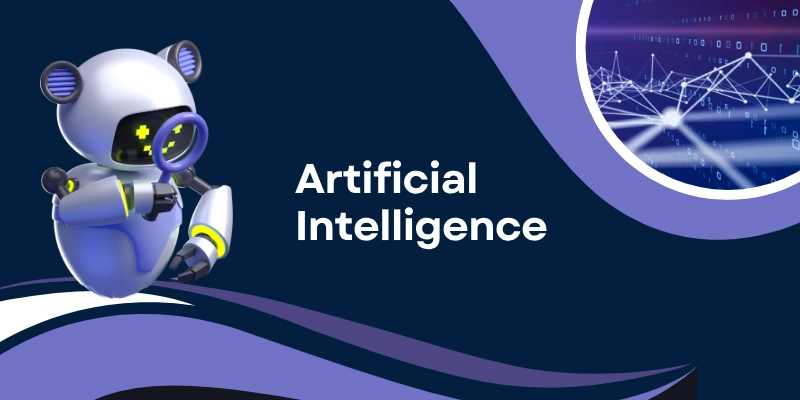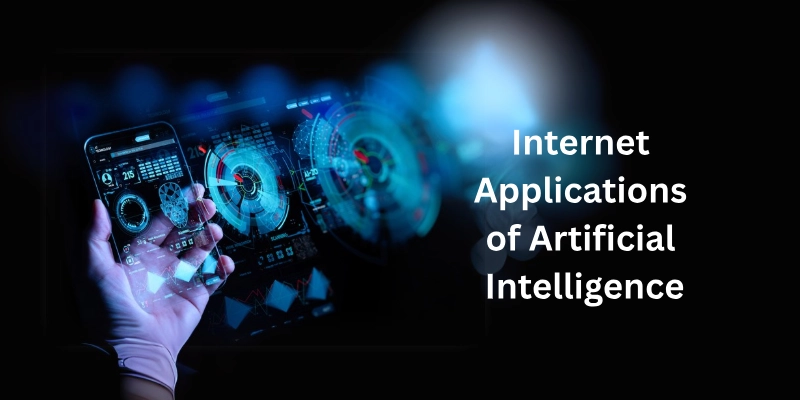What is Artificial Intelligence, and What are its Internet Applications?
Published: 26 May 2025
Artificial Intelligence (AI) is the simulation of human intelligence in machines designed to think and perform tasks that typically require human intelligence. These tasks include problem-solving, understanding language, recognizing patterns, learning from experience, and even decision-making.

AI systems use algorithms, data, and computational power to mimic cognitive processes like reasoning, perception, and learning.AI has seen rapid advancements in recent years, especially with the growth of machine learning, deep learning, and natural language processing (NLP).
These technologies have allowed AI to improve and automate a wide range of tasks, making it an essential tool in various industries.
Internet Applications of Artificial Intelligence
The internet is one of the primary areas where AI is having a profound impact. Below are some key internet applications of AI:
Search Engines and Information Retrieval
- Google Search: AI is used to rank search results, understand user intent, and improve the accuracy of results. Algorithms like Google’s RankBrain use machine learning to enhance search quality.
- Personalized Search: AI tracks user behavior and preferences to deliver more relevant search results based on individual interests.

Social Media
- Content Curation: AI is used by platforms like Facebook, Instagram, and TikTok to analyze user preferences and provide personalized feeds with recommended posts, videos, and ads.
- Sentiment Analysis: AI tools analyze social media posts and comments to gauge public sentiment or customer opinions.
- Chatbots and Virtual Assistants: Many social media platforms now deploy AI-driven bots to answer questions and provide customer support in real time.
E-Commerce
- Product Recommendations: AI algorithms analyze past user behavior and preferences to suggest products that the user is likely to purchase. Websites like Amazon and eBay use this extensively.
- Price Optimization: AI can dynamically adjust product prices based on factors like demand, competitor pricing, and user behavior.
- Inventory Management: AI helps online retailers manage stock, predict demand, and optimize logistics.
Advertising and Marketing
- Targeted Ads: AI analyzes user data such as browsing history, demographic information, and preferences to serve highly targeted ads that are more likely to lead to conversions.
- Email Campaigns: AI is used to personalize email content, automate responses, and analyze campaign performance.
- Predictive Analytics: AI tools predict consumer behavior, helping marketers optimize their campaigns and improve ROI.
Voice Assistants
- Amazon Alexa, Google Assistant, Siri: AI powers voice recognition and natural language processing in these assistants, allowing users to interact with devices through voice commands to perform tasks such as setting reminders, playing music, or controlling smart home devices.
Cybersecurity
- Threat Detection: AI systems are used to identify potential security threats and detect unusual patterns of behavior, which can be early indicators of cyberattacks like phishing or hacking.
- Fraud Prevention: AI algorithms monitor online transactions in real-time, identifying anomalies and preventing fraudulent activity in industries such as banking and e-commerce.
Autonomous Vehicles
- AI plays a key role in the development of self-driving cars, using internet connectivity to process data from sensors, cameras, and GPS systems to navigate, detect obstacles, and make driving decisions in real-time.
Content Creation and Curation
- Automated Journalism: AI systems like GPT-3 (the engine behind ChatGPT) are used by news organizations to generate articles, summaries, and reports, especially for data-heavy topics.
- AI-generated Art and Music: AI tools create music, artwork, and even videos by learning from large datasets, enabling creators to produce unique content.
Healthcare
- Telemedicine: AI is integrated into online health platforms, helping diagnose diseases, suggest treatments, and provide virtual consultations.
- Predictive Health: AI analyzes data from wearable devices and online health records to predict potential health issues before they become serious.
Customer Support and Service
- Chatbots: AI-powered chatbots are used on websites and customer service portals to answer inquiries, resolve issues, and assist customers 24/7.
- Help Desk Automation: AI systems can automate common support tasks, escalate complex issues to human agents, and improve overall customer satisfaction.
Conclusion
Artificial Intelligence is revolutionizing the way we interact with the internet, automating tasks, enhancing personalization, improving security, and transforming industries like healthcare, e-commerce, and marketing. As AI continues to evolve, its applications in the digital world are expected to expand, leading to even more innovative solutions and seamless user experiences.
Share this article with others who want to understand how AI transforms our online experiences. Have questions or insights? Leave a comment below.
FAQs
Here are some frequently asked questions to help you better understand Artificial Intelligence (AI) and its various applications:
Artificial Intelligence (AI) refers to the simulation of human intelligence in machines that are programmed to perform tasks that typically require human cognitive abilities, such as problem-solving, learning, speech recognition, and decision-making.
AI works by using algorithms and data to simulate human thinking. It learns from large datasets, identifies patterns, and improves its performance over time through processes like machine learning and deep learning.
The main types of AI are:
- Narrow AI: AI designed to perform specific tasks (e.g., voice assistants, facial recognition).
- General AI: A hypothetical AI that can perform any intellectual task a human can do.
- Superintelligent AI: A future concept of AI that surpasses human intelligence in all aspects.
AI is used in social media for content recommendations, targeted advertising, sentiment analysis, and chatbots for customer support. It helps platforms personalize user experiences by analyzing preferences and behaviors.
AI itself doesn’t directly impact internet speed, but it can optimize certain tasks related to network management, such as traffic routing, identifying issues with network congestion, or optimizing server load balancing.
In e-commerce, AI enhances product recommendations, optimizes pricing, manages inventory, and personalizes marketing campaigns, leading to better customer experiences and increased sales.
While AI has the potential to offer significant benefits, there are concerns regarding privacy, security, and bias. Ensuring ethical use of AI, transparency, and robust security measures is essential to mitigate risks.
AI is used in healthcare for diagnostic assistance, personalized treatment plans, predicting patient outcomes, drug discovery, and virtual health consultations. It helps improve efficiency and decision-making in medical practices.
AI in cybersecurity helps detect and prevent threats in real time by analyzing vast amounts of data for unusual patterns and potential attacks. It can also automate responses to security breaches and identify vulnerabilities in systems.
While AI may automate certain tasks and job functions, it is also expected to create new job opportunities in areas like AI development, data science, and machine learning. The key is adapting to changes and focusing on skills that complement AI technology.

- Be Respectful
- Stay Relevant
- Stay Positive
- True Feedback
- Encourage Discussion
- Avoid Spamming
- No Fake News
- Don't Copy-Paste
- No Personal Attacks

- Be Respectful
- Stay Relevant
- Stay Positive
- True Feedback
- Encourage Discussion
- Avoid Spamming
- No Fake News
- Don't Copy-Paste
- No Personal Attacks





